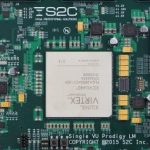When we talk about the Internet of Things (IoT), it isn’t a stretch to say that every intelligent device we interact with will become connected, sharing vast amounts of data with one another to make our lives more efficient. It isn’t only consumers of smart home, infotainment, and wearable technologies that are driving the demand,… Read More
Tag: s2c
Webinar: Achieve High-performance and High-throughput with Intel based FPGA Prototyping
FPGAs have been used for ASIC prototyping since the beginning of FPGAs (1980s) allowing hardware and software designers to work in harmony developing, testing, and optimizing their products. We covered the history of FPGAs in Chapter 3 of our book “Fabless: The Transformation of the Semiconductor Industry”, which includes … Read More
A Delicate Choice – Emulation versus Prototyping
Hardware-assisted verification has been with us (commercially) for around 20 years and at this point is clearly mainstream. But during this evolution it split into at least two forms (emulation and prototyping), robbing us of a simple choice – to hardware-assist or not to hardware-assist (that is the question). Which in turn … Read More
CEO Interview: Toshio Nakama of S2C
I haven’t sat down to speak with S2C since we collaborated on the book, PROTOTYPICAL, published just before DAC 2016 and even then, I hadn’t spoken to Toshio Nakama, their CEO. Toshio splits his time between the San Jose headquarters and the Shanghai headquarters so getting time to meet face-to-face has been challenging. I was finally… Read More
The Future of FPGA Prototyping!
This interview originally appeared as the foreword to our book “Prototypical: The Emergence of FPGA-based Prototyping for SoC Design” but I thought it would be worth publishing for those of you who have not downloaded it yet. I also wanted to mention that our friends at S2C are currently offering a 50% discount on the… Read More
OpenCL hits FPGA-based prototyping modules
OpenCL brings algorithm development into a unified programming model regardless of the core, working across CPUs, GPUs, DSPs, and even FPGAs. Intel has been pushing OpenCL programming for some time, particularly at the high end with “Knights Landing” processors. Where other vendors are focused on straight-up C high-level … Read More
S2C adds support for Juno ARM dev platform
We’ve had several blogs introducing the Juno ARM Development Platform as a vehicle for ARMv8-A software development. S2C has jumped in with a module connecting their FPGA-based prototyping platform to the Juno, enabling more advanced IP… Read More
Time-saving modules expand Prototype Ready family
A big advantage of FPGA-based prototyping is the ability to run real-world I/O at-speed, significantly faster and more accurately than hardware emulation systems typically requiring a protocol adapter. Dealing with real-world I/O means more thorough verification of SoC integration, and the opportunity to optimize systems… Read More
S2C tutorial and PROTOTYPICAL debut at DAC
It’s been a busy few days here in Canyon Lake, and we’re ready to share exciting news in advance of #53DAC coming up on Monday, June 6[SUP]th[/SUP]. S2C is offering a technical program tutorial on “Overcoming the Challenges of FPGA Prototyping” followed by the launch of our latest book project, “PROTOTYPICAL”, including a field… Read More
Solving the Next Big SoC Challenges with FPGA Prototyping
The health of the semiconductor industry revolves around the “start”. Chip design starts translate to wafer starts, and both support customer design wins and product shipments. Roadmaps develop for expanding product offerings, and capital expenditures flow in to add capacity enabling more chip designs and wafer starts. If… Read More





